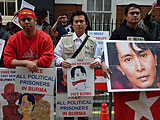America Dips Toe in Burmese Waters
By Simon Roughneen for ISN
A high-level US delegation visited Burma on Tuesday and Wednesday this week, meeting with Prime Minister General Thein Sein and with opposition leader Aung San Suu Kyi. Significantly, US Assistant Secretary of State Kurt Campbell did not meet Burma's ruling strongman Sen Gen Than Shwe, who really calls the shots.
The meetings are part of the new US engagement policy with the junta, softening the isolationist stance taken by the Bush and Clinton administrations, but retaining the targeted sanctions on the ruling generals and business cronies first implemented in 1997.
However, his trip was described as “exploratory,” and dissidents outside Burma remain skeptical, with reason. In the days before the meeting the junta rounded up journalists in Rangoon and arrested some aid workers involved in Cyclone Nargis relief.
The US is considering easing sanctions, but it not clear what steps the junta is willing to take. No benchmarks have been set, though the US has asked for the release of Aung San Suu Kyi from house arrest, the release of all political prisoners (there are over 2,000) and international monitoring of the 2010 elections.
Even if the elections are free, the framework provided by the 2008 constitution ensures continued military rule. Whether the US will push for a constitutional review is unclear, though Suu Kyi's National League for Democracy (NLD), which won the last elections held in Burma, wants the document reviewed.
Skeptics say that the junta has played along with 'engagement' efforts in the past – notably with US Senator Bill Richardson in 1994, and with various UN envoys – including a public snub to UN Secretary-General Ban Ki-moon earlier this year, who was denied meetings with either Suu Kyi or Shwe. Moreover, as far back as when Richardson visited in 1994, Suu Kyi said that she was willing to negotiate with the junta. So 15 years on, it seems the wheel has come full circle, but still is spinning in the sand thrown down by the junta.
Than Shwe perhaps wants to reduce dependence on China for international diplomatic support, though Beijing has started construction of a major new pipeline across Burma, which will reduce dependence on maritime oil and gas imports. The dependence cuts both ways and China needs this pipeline. It also wants to retain its favored investor status with the junta, amid competition from India, Thailand and others.
The US seems keen to get more involved in Southeast Asia. President Barack Obama will meet ASEAN leaders – Burmese PM Thein Sein included – at the first ever US-ASEAN summit in Singapore next week.
Campbell's visit lays the groundwork for summit discussions on Burma, which the Singapore hosts anticipate will take place at the summit. The most poignant concession would be to release Aung San Suu Kyi – though she is already barred from running in the 2010 elections.
Nothing less should warrant a review of the US sanctions, remembering that a previous UN envoy helped negotiate a release for Suu Kyi, only for the junta to return her to incarceration later.
Perhaps even more important would be public pressure from Obama on the junta to review the flawed constitution.
The Burmese junta has a long history of playing outside powers against each other and stringing along those who 'engage' with it. The US policy has not been explained well, giving the impression that it is going soft on human rights in Burma and Southeast Asia, and allowing some Asian countries to justify their history of cozy relations with the junta.
‘Engagement’ also threatens to give false legitimacy to the 2010 elections, which seem pre-loaded in favor of junta candidates and parties stuffed with ‘retired’ military.

